
The first name that pops out when discussing Chicago Bulls’ shooting guards is Michael Jordan, widely regarded as the greatest player of all time. Jordan achieved greatness with Chicago, delivering six NBA titles with the franchise. However, before and after Jordan came a host of shooting guards who did their best to hold down the spot. Currently, Zach LaVine occupies that position, but it is interesting to see the Bulls starting shooting guards from 1980 to 2024.
1980-1983: Reggie Theus
Career Stats With The Bulls: 18.8 PPG, 3.4 RPG, 5.6 APG, 1.3 SPG, 0.2 BPG
Career Achievements With The Bulls: 2x All-Star, 1978-79 All-Rookie Team Selection
In the early '80s, Reggie Theus was a standout player for the Bulls. He was a dynamic scorer and playmaker, averaging 20.3 points per game during his time with the team. Theus was known for his smooth ball handling and ability to create his own shot, making him a fan favorite and a key offensive weapon for the Bulls. These early years set the stage for the Bulls to become one of the most successful franchises in NBA history, particularly in the '90s with the emergence of Michael Jordan.
While Theus may not have achieved the same level of success as Jordan would, he played an important role in shaping the identity of the team during a transitional period because he made two All-Star Teams during this period and was a key star for the franchise.
1984: Quintin Dailey
Career Stats With The Bulls: 16.4 PPG, 2.8 RPG, 2.9 APG, 1.0 SPG, 0.1 BPG
Career Achievements With The Bulls: 1982-83 All-Rookie Team Selection
In 1984, Quintin Dailey took over the starting shooting guard role. Dailey was a prolific scorer and was often the go-to option on offense. He had a knack for getting to the basket and drawing fouls, making him a difficult matchup for opposing defenses. However, Dailey's career with the Bulls was marred by off-court issues, which ultimately led to his departure from the team but he held down the starting spot for 42 starts in 82 games played.
1985: Michael Jordan
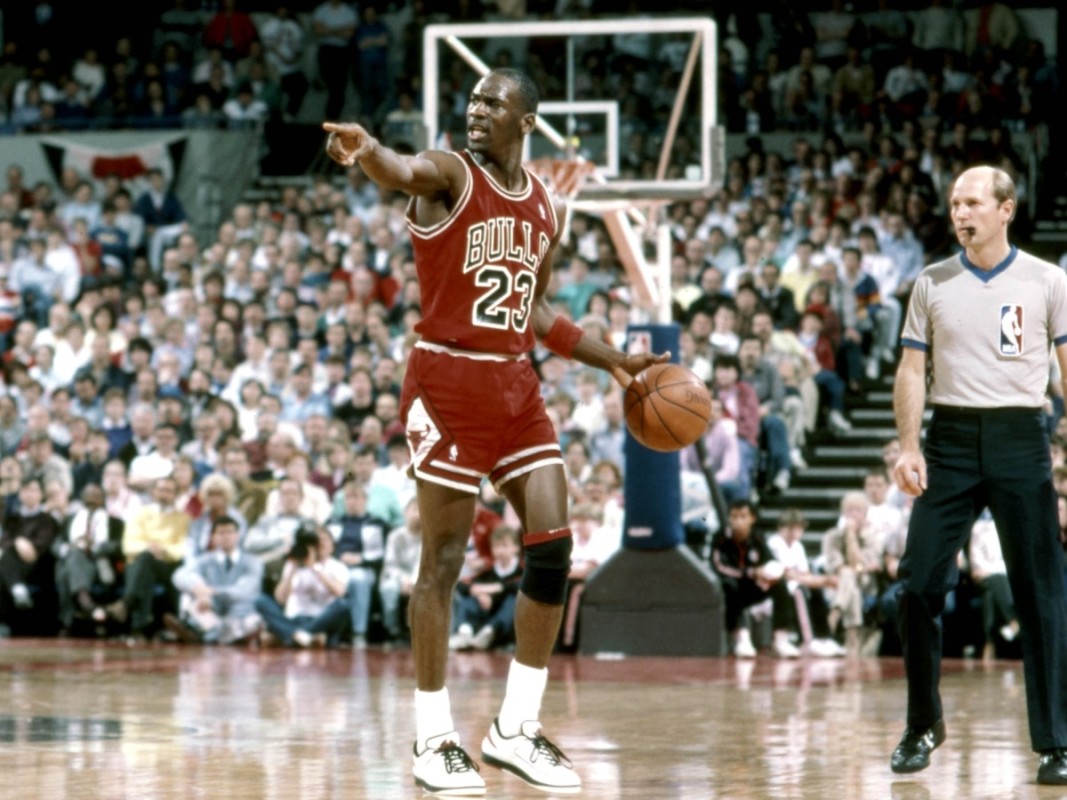
Career Stats With The Bulls: 31.5 PPG, 6.3 RPG, 5.4 APG, 2.5 SPG, 0.9 BPG
Career Achievements With The Bulls: 6x NBA Champion, 6x Finals MVP, 5x MVP, 12x All-Star, 11x All-NBA Team Selection, 9x All-Defensive Team Selection, 1987-1988 Defensive Player of the Year, 10x Scoring Champion, 3x Steals Champion, 3x All-Star Game MVP, 1984-1985 Rookie of the Year, 1984-85 All-Rookie Team Selection
In 1985, the Chicago Bulls drafted Michael Jordan with the No. 3 overall pick, and he immediately took over as the team's starting shooting guard. Jordan's rookie season was nothing short of spectacular, as he quickly established himself as one of the most electrifying players in the NBA. He averaged an impressive 28.2 points per game, earning him the NBA Rookie of the Year award.
Despite being a rookie, Jordan's talent and athleticism were evident from the start. He showcased his scoring prowess with a remarkable ability to drive to the basket, finish at the rim, and knock down mid-range jump shots. While Jordan's individual brilliance was evident, the Bulls as a team struggled to find consistent success during his rookie season, finishing with a record of 38-44 but somehow still made the playoffs but lost in the first round. Despite the team's overall performance, Jordan's impact was undeniable, and he provided Bulls fans with plenty of excitement and hope for the future.
1986: George Gervin
Career Stats With The Bulls: 16.2 PPG, 2.6 RPG, 1.8 APG, 0.6 SPG, 0.3 BPG
Career Achievements With The Bulls: N/A
In 1986, the Chicago Bulls acquired the legendary George "The Iceman" Gervin to take over the starting shooting guard position with Jordan out with a broken foot. Gervin was already a seasoned veteran in the NBA, known for his smooth scoring ability and trademark finger roll. Although he was in the later stages of his career when he joined the Bulls, Gervin still had plenty to offer on the offensive end.
Gervin provided the Bulls with a steady scoring presence, averaging 16.2 points per game. His experience and basketball IQ were invaluable to a young Bulls team that was still finding its identity. Gervin's leadership and mentorship of younger players, including Michael Jordan, helped accelerate their development and understanding of the game but this was just a stop-gap until Jordan returned from injury because the 1986 season would be his last season in the NBA.
1987-1993: Michael Jordan
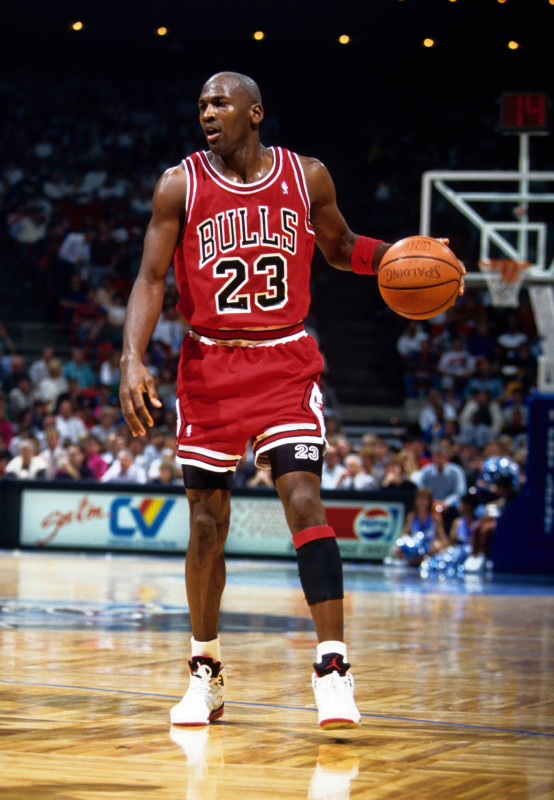
Career Stats With The Bulls: 31.5 PPG, 6.3 RPG, 5.4 APG, 2.5 SPG, 0.9 BPG
Career Achievements With The Bulls: 6x NBA Champion, 6x Finals MVP, 5x MVP, 12x All-Star, 11x All-NBA Team Selection, 9x All-Defensive Team Selection, 1987-1988 Defensive Player of the Year, 10x Scoring Champion, 3x Steals Champion, 3x All-Star Game MVP, 1984-1985 Rookie of the Year, 1984-85 All-Rookie Team Selection
From 1987 to 1993, Michael Jordan solidified his status as the face of the Chicago Bulls and one of the greatest players in NBA history. Following his sensational rookie season, Jordan continued to elevate his game to new heights, establishing himself as a dominant force on both ends of the court once he returned from injury. His scoring prowess was unmatched, and he became known for his incredible athleticism, unmatched work ethic, and competitive spirit.
During this period, Jordan won three NBA championships with the Bulls (1991, 1992, and 1993) and earned three NBA Finals MVP awards. He also won three regular-season MVP awards, in 1988, 1991, and 1992, and won seven scoring titles. His list of accolades and achievements during these years is staggering, and he set numerous records that still stand today.
Jordan's ability to take over games and make clutch plays in crucial moments made him a legend. He had a knack for performing at his best when it mattered most, earning him the reputation as one of the most clutch players in NBA history. His iconic "Flu Game" in the 1997 NBA Finals, where he scored 38 points while battling flu-like symptoms, is just one example of his ability to rise to the occasion.
The 1992-1993 season marked the end of Jordan's first tenure with the Bulls, as he announced his retirement from basketball to pursue a career in professional baseball. His departure left a void in the Bulls lineup and left fans wondering if the team could maintain its success without him. Jordan's time with the Bulls from 1987 to 1993 is widely considered one of the greatest individual runs in sports history, and he remains an iconic figure in both Chicago and basketball lore.
1994: Pete Myers

Career Stats With The Bulls: 5.7 PPG, 1.9 RPG, 2.3 APG, 0.8 SPG, 0.2 BPG
Career Achievements With The Bulls: N/A
In 1994, following Michael Jordan's surprising retirement from basketball to pursue a career in professional baseball, Pete Myers stepped into the starting shooting guard role for the Chicago Bulls. Myers was a journeyman player who had bounced around the NBA before finding a home in Chicago. While he didn't possess the star power or scoring ability of Jordan, Myers was a solid defender and a capable role player.
During the 1993-1994 season, Myers provided the Bulls with a steady presence on the defensive end and contributed to the team's overall effort with his hustle and energy. He averaged 7.9 points, 2.2 rebounds, and 3.0 assists per game, playing a complementary role alongside Scottie Pippen and the rest of the Bulls' supporting cast. Despite the team's collective efforts, the Bulls struggled to replicate the success they had enjoyed with Jordan, finishing the season with a record of 55-27 and losing in the second round of the playoffs.
1995: Ron Harper
Career Stats With The Bulls: 7.9 PPG, 3.0 RPG, 2.6 APG, 1.3 SPG, 0.5 BPG
Career Achievements With The Bulls: 3x NBA Champion
In 1995, the Chicago Bulls made a significant addition to their lineup by bringing in Ron Harper to take over the starting shooting guard position. Harper, a versatile and athletic guard, was coming off a successful stint with the Cleveland Cavaliers and was known for his defensive prowess and ability to score both inside and outside. His arrival brought a new dimension to the Bulls' lineup and helped solidify their status as championship contenders.
During the season, Harper's first with the Bulls, he provided the team with a balanced scoring attack and was a key contributor on the defensive end. He averaged 6.9 points, 2.3 rebounds, and 2.0 assists per game, while also serving as a lockdown defender against opposing guards. Harper's size, athleticism, and basketball IQ made him a perfect fit alongside Michael Jordan, Scottie Pippen, and the rest of the Bulls' talented roster.
1996-1998: Michael Jordan
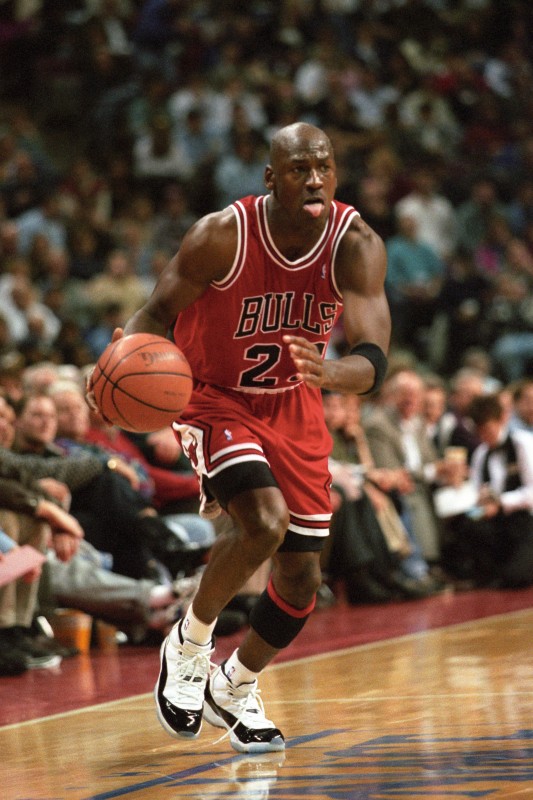
Career Stats With The Bulls: 31.5 PPG, 6.3 RPG, 5.4 APG, 2.5 SPG, 0.9 BPG
Career Achievements With The Bulls: 6x NBA Champion, 6x Finals MVP, 5x MVP, 12x All-Star, 11x All-NBA Team Selection, 9x All-Defensive Team Selection, 1987-1988 Defensive Player of the Year, 10x Scoring Champion, 3x Steals Champion, 3x All-Star Game MVP, 1984-1985 Rookie of the Year, 1984-85 All-Rookie Team Selection
From 1996 to 1998, Michael Jordan returned to the Chicago Bulls and resumed his role as the team's starting shooting guard. Jordan's second tenure with the Bulls was arguably even more impressive than his first, as he led the team to an unprecedented second three-peat, winning three consecutive NBA championships (1996, 1997, and 1998) and earning three more NBA Finals MVP awards.
During these years, Jordan continued to showcase his unmatched scoring ability, incredible athleticism, and competitive fire. He won the NBA scoring title in each of these seasons and was named the NBA Most Valuable Player in 1996 and 1998. His performance in the 1996 NBA Finals, where he averaged 27.3 points per game and led the Bulls to a series win over the Seattle SuperSonics, was particularly memorable.
The 1997-1998 season, which would turn out to be Jordan's final season with the Bulls, was one of his most remarkable. Despite facing numerous challenges, including injuries to key players and speculation about his future, Jordan led the Bulls to their sixth NBA championship in 1998, sealing his legacy as one of the greatest players in NBA history.
1999: Ron Harper
Career Stats With The Bulls: 7.9 PPG, 3.0 RPG, 2.6 APG, 1.3 SPG, 0.5 BPG
Career Achievements With The Bulls: 3x NBA Champion
In 1999, following Michael Jordan's second retirement from basketball, Ron Harper returned as the Chicago Bulls' starting shooting guard. Harper, who had been a key contributor to the Bulls' championship teams from 1996 to 1998, once again stepped into a leadership role and provided the team with a veteran presence during a transitional period. During the lockout-shortened 1999 season, Harper continued to be a reliable contributor for the Bulls. He averaged 11.2 points, 5.1 rebounds, and 3.3 assists per game, while also serving as a mentor to the team's younger players.
Despite the team's struggles on the court, Harper's professionalism, work ethic, and championship experience were invaluable to a Bulls team in transition. Harper's ability to adapt to different roles and contribute in multiple ways made him a valuable asset to the Bulls during this period of rebuilding. His defensive tenacity, basketball IQ, and unselfish play were instrumental in helping the Bulls maintain a competitive edge, even as they faced challenges in the post-Jordan era.
2000: Hersey Hawkins
Career Stats With The Bulls: 7.9 PPG, 2.9 RPG, 2.2 APG, 1.2 SPG, 0.2 BPG
Career Achievements With The Bulls: N/A
In 2000, the Chicago Bulls turned to Hersey Hawkins to fill the starting shooting guard position. Hawkins, a seasoned veteran with a reputation as a reliable scorer and solid defender, was acquired by the Bulls to provide leadership and stability to a young and rebuilding team. His experience and basketball IQ made him a valuable addition to the Bulls' roster.
During the season, Hawkins served as a steady presence in the Bulls' lineup. He averaged 7.9 points, 2.9 rebounds, and 2.2 assists per game, while also providing the team with consistent perimeter shooting and solid defense. Hawkins' ability to contribute on both ends of the court and his professionalism were important factors in helping the Bulls remain competitive during a challenging period.
2001: Ron Mercer
Career Stats With The Bulls: 18.6 PPG, 3.9 RPG, 3.2 APG, 1.1 SPG, 0.4 BPG
Career Achievements With The Bulls: N/A
Ron Mercer, a talented scorer and former first-round draft pick, was expected to provide the Bulls with a much-needed offensive boost. His ability to create his own shot and score from anywhere on the court made him an appealing option for a Bulls team in search of scoring. During the 2000-2001 season, Mercer led the Bulls in scoring, averaging 19.7 points per game, to go along with 3.9 rebounds and 3.3 assists per game.
He quickly established himself as the go-to scoring option for the Bulls and provided the team with a much-needed offensive spark. Mercer's scoring ability and versatility made him a valuable asset to the Bulls' lineup and helped keep the team competitive during a challenging season. While Mercer's individual performance was impressive, the Bulls struggled as a team, finishing with a record of 15-67.
2002-2003: Trenton Hassell
Career Stats With The Bulls: 6.4 PPG, 3.2 RPG, 2.0 APG, 0.6 SPG, 0.7 BPG
Career Achievements With The Bulls: N/A
Trenton Hassell, known for his defensive tenacity and hustle, was a second-round draft pick by the Bulls in 2001. He quickly established himself as a reliable perimeter defender and a versatile player capable of guarding multiple positions. During the 2002 season, Hassell's first as the Bulls' starting shooting guard, he averaged 8.7 points, 3.3 rebounds, and 2.2 assists per game. While his offensive numbers were modest, Hassell's impact on the defensive end was significant. He often drew the assignment of guarding the opposing team's best perimeter player and was a key contributor to the Bulls' defensive efforts.
Despite Hassell's contributions on defense the following year, the Bulls struggled as a team, finishing with a record of 30-52 in the 2003 season. Despite the team's struggles, Hassell's defensive prowess and work ethic were appreciated by Bulls fans and his teammates alike. Following the 2003 season, Hassell's time with the Bulls came to an end, as the team continued to rebuild and reshape its roster.
2004: Jamal Crawford
Career Stats With The Bulls: 11.2 PPG, 2.4 RPG, 3.8 APG, 1.0 SPG, 0.3 BPG
Career Achievements With The Bulls: N/A
Jamal Crawford, known for his flashy ball-handling, scoring ability, and instant offense off the bench, was acquired by the Bulls to provide a spark on the offensive end. His scoring prowess and ability to create his own shot made him an exciting addition to a young Bulls team. During the 2003-2004 season, Crawford led the Bulls in scoring, averaging 17.3 points per game, along with 5.1 assists per game.
He quickly established himself as a dynamic scoring threat and provided the Bulls with a much-needed offensive spark. Crawford's ability to score in bunches and create scoring opportunities for his teammates made him a valuable asset to the Bulls' lineup. Despite Crawford's individual scoring prowess, the Bulls struggled as a team, finishing with a record of 23-59 in the 2004 season.
2005: Kirk Hinrich
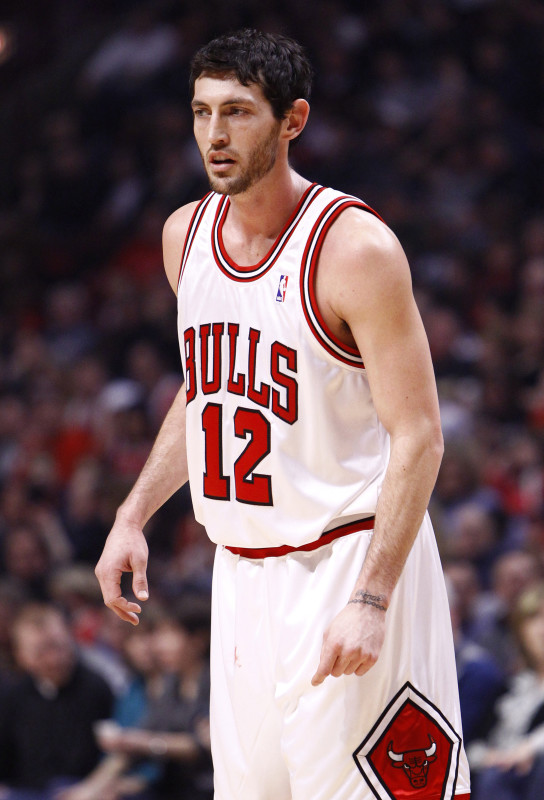
Career Stats With The Bulls: 11.4 PPG, 3.0 RPG, 5.1 APG, 1.1 SPG, 0.3 BPG
Career Achievements With The Bulls: 2006-07 All-Defensive Second Team, 2003-04 All-Rookie Team Selection
Kirk Hinrich, a versatile and intelligent player known for his all-around skills, was drafted by the Bulls in 2003 and quickly established himself as a key contributor on both ends of the court. His ability to score, distribute the ball, and play solid defense made him a perfect fit for the Bulls' system.
During the 2004-2005 season, Hinrich had a breakout year as the Bulls' starting shooting guard. He averaged 15.7 points, 6.4 assists, and 1.6 steals per game, showcasing his ability to impact the game in multiple ways. Hinrich's leadership, basketball IQ, and competitive spirit were instrumental in helping the Bulls improve their record to 47-35 and return to the playoffs after a six-year absence although they lost in the first round to the Washington Wizards.
2006-2009: Ben Gordon
Career Stats With The Bulls: 18.5 PPG, 3.0 RPG, 3.0 APG, 0.8 SPG, 0.2 BPG
Career Achievements With The Bulls: 2004-05 Sixth Man of the Year, 2004-05 All-Rookie Team Selection
From 2006 to 2009, Ben Gordon took over the starting shooting guard position for the Chicago Bulls. Gordon, known for his scoring ability and knack for hitting clutch shots, was drafted by the Bulls with the No. 3 overall pick in the 2004 NBA Draft. He quickly established himself as a dynamic scorer and played a crucial role in the Bulls' return to playoff contention.
During his tenure as the Bulls' starting shooting guard, Gordon was a prolific scorer, averaging 21.4 points per game during the 2007 season, 18.6 points per game in 2008, and 20.7 points per game in 2009. His ability to create his own shot, knock down three-pointers, and score in bunches made him a valuable offensive weapon for the Bulls.
Gordon's scoring prowess was on full display during the 2009 NBA Playoffs, where he averaged 24.3 points per game and helped lead the Bulls to an epic first-round series win over the Boston Celtics. His performance in that series, including a memorable 42-point outburst in Game 2, solidified his reputation as a clutch performer and big-game player.
2010: John Salmons
Career Stats With The Bulls: 14.6 PPG, 3.7 RPG, 2.3 APG, 1.2 SPG, 0.5 BPG
Career Achievements With The Bulls: N/A
John Salmons, a seasoned veteran known for his scoring ability and versatility, was acquired by the Bulls in a mid-season trade with the Sacramento Kings before the end of the 2009 season. His ability to score, create his own shot, and defend multiple positions made him a valuable addition to the Bulls' lineup.
During the 2009-2010 season, Salmons played a key role in the Bulls' push for a playoff spot. He averaged 12.7 per game during his time with the Bulls, providing the team with a much-needed offensive spark. Salmons' ability to score in a variety of ways and his knack for making timely plays were crucial to the Bulls' success down the stretch.
2011: Keith Bogans
Career Stats With The Bulls: 4.4 PPG, 1.8 RPG, 1.2 APG, 0.5 SPG, 0.1 BPG
Career Achievements With The Bulls: N/A
Keith Bogans was brought in by the Bulls to provide a defensive presence and spacing on the offensive end. His ability to guard opposing teams' best perimeter players and knock down open shots made him a fit for the Bulls' system. During the 2011 season, Bogans started 82 games for the Bulls, averaging 4.4 points, 1.8 rebounds, and 1.2 assists per game.
While his offensive numbers were modest, Bogans' contributions on the defensive end and his ability to space the floor were appreciated by Bulls coach Tom Thibodeau and his teammates. He played a role in helping the Bulls finish the regular season with the best record in the NBA at 62-20 alongside MVP Derrick Rose.
2012: Ronnie Brewer
Career Stats With The Bulls: 6.5 PPG, 3.3 RPG, 1.9 APG, 1.2 SPG, 0.3 BPG
Career Achievements With The Bulls: N/A
In 2012, Ronnie Brewer took over the starting shooting guard position for the Chicago Bulls. Brewer, known for his defensive prowess, athleticism, and high basketball IQ, was signed by the Bulls to provide a defensive presence and energy on both ends of the floor. His ability to guard multiple positions and contribute in various ways made him a valuable addition to the Bulls' lineup.
During the lockout-shortened 2012 season, Brewer started 43 games for the Bulls, averaging 6.9 points, 3.5 rebounds, and 2.1 assists per game. While his offensive numbers were modest, Brewer's contributions on the defensive end and his ability to move without the ball and create scoring opportunities for his teammates were appreciated by Bulls coach Tom Thibodeau and his teammates.
2013: Richard Hamilton

Career Stats With The Bulls: 10.5 PPG, 1.9 RPG, 2.6 APG, 0.5 SPG, 0.1 BPG
Career Achievements With The Bulls: N/A
In 2013, Richard Hamilton, a seasoned veteran with a reputation as a skilled scorer and excellent mid-range shooter, was required to provide a scoring punch and veteran leadership. His ability to score efficiently and create offense for himself and his teammates made him a valuable addition to the Bulls' lineup.
During the 2013 season, Hamilton started 45 games for the Bulls, averaging 9.8 points and 2.4 assists per game on 30.8% from three. While injuries limited his availability and impact throughout the season, Hamilton's scoring ability and veteran presence were appreciated by Bulls coach Tom Thibodeau and his teammates. Despite Hamilton's contributions, the Bulls struggled with injuries and finished the regular season with a record of 45-37 and were defeated by the Miami Heat.
2014-2016: Jimmy Butler
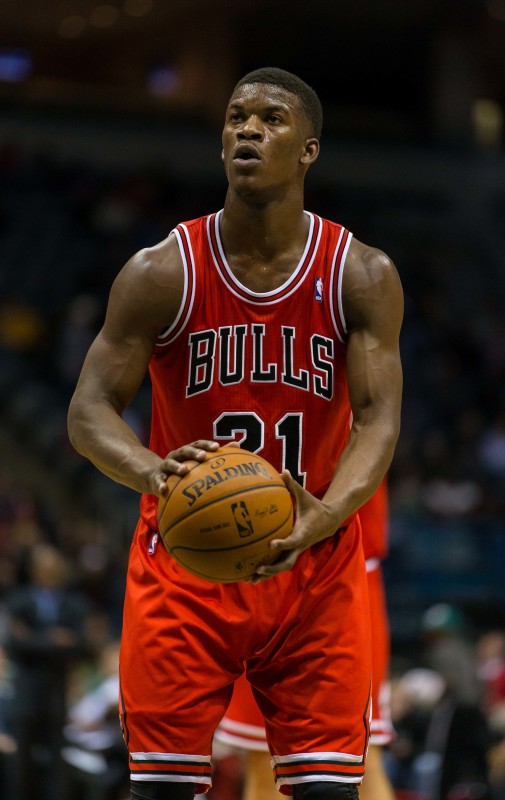
Career Stats With The Bulls: 15.6 PPG, 4.8 RPG, 3.1 APG, 1.5 SPG, 0.5 BPG
Career Achievements With The Bulls: 3x All-Star, 2016-17 All-NBA Third Team Selection, 3x All-Defensive Second Team Selection, 2014-15 Most Improved Player of the Year
Jimmy Butler, a rising star known for his two-way play, work ethic, and leadership, quickly established himself as one of the premier shooting guards in the NBA. His ability to score, defend multiple positions, and make plays for his teammates made him the focal point of the Bulls' offense and defense. During his tenure as the Bulls' starting shooting guard, Butler's game reached new heights.
He averaged 20.0 points, 5.8 rebounds, 3.3 assists, and 1.8 steals per game during the 2015 season, earning his first All-Star selection. Butler's scoring ability, especially in clutch situations, and his defensive prowess were crucial to the Bulls' success. In the 2015 playoffs, Butler played a key role in the Bulls' first-round series victory over the Milwaukee Bucks, but the team was ultimately defeated by the Cleveland Cavaliers in the Eastern Conference Semifinals.
Following the 2017 season, Butler was traded by the Bulls to the Minnesota Timberwolves in a blockbuster deal. Despite his departure, Butler's contributions to the Bulls' success during his tenure as the starting shooting guard make him one of the most beloved and respected players in recent history.
2017: Dwyane Wade
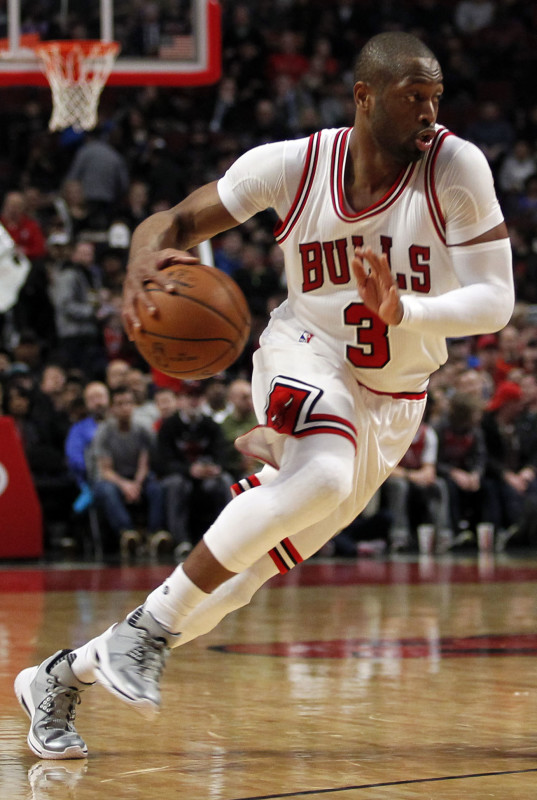
Career Stats With The Bulls: 18.3 PPG, 4.5 RPG, 3.8 APG, 1.4 SPG, 0.7 BPG
Career Achievements With The Bulls: N/A
In 2017, Dwyane Wade took over the starting shooting guard position for the Chicago Bulls. Wade, a future Hall of Famer and three-time NBA champion was signed by the Bulls to provide veteran leadership, scoring, and playmaking. His championship experience, scoring ability, and ability to create for himself and his teammates made him a valuable addition to the Bulls' lineup.
During the 2016-2017 season, Wade started 59 games for the Bulls, averaging 18.3 points, 4.5 rebounds, 3.8 assists, and 1.4 steals per game. Despite his individual success, the Bulls struggled with consistency and chemistry issues throughout the season, finishing with a record of 41-41 and sneaking into the playoffs as the eighth seed in the Eastern Conference.
In the playoffs, Wade continued to provide scoring and veteran leadership for the Bulls. He averaged 15.0 points, 5.0 rebounds, and 4.0 assists per game in the playoffs, but the Bulls were ultimately defeated by the Boston Celtics in the first round.
2018-2024: Zach LaVine
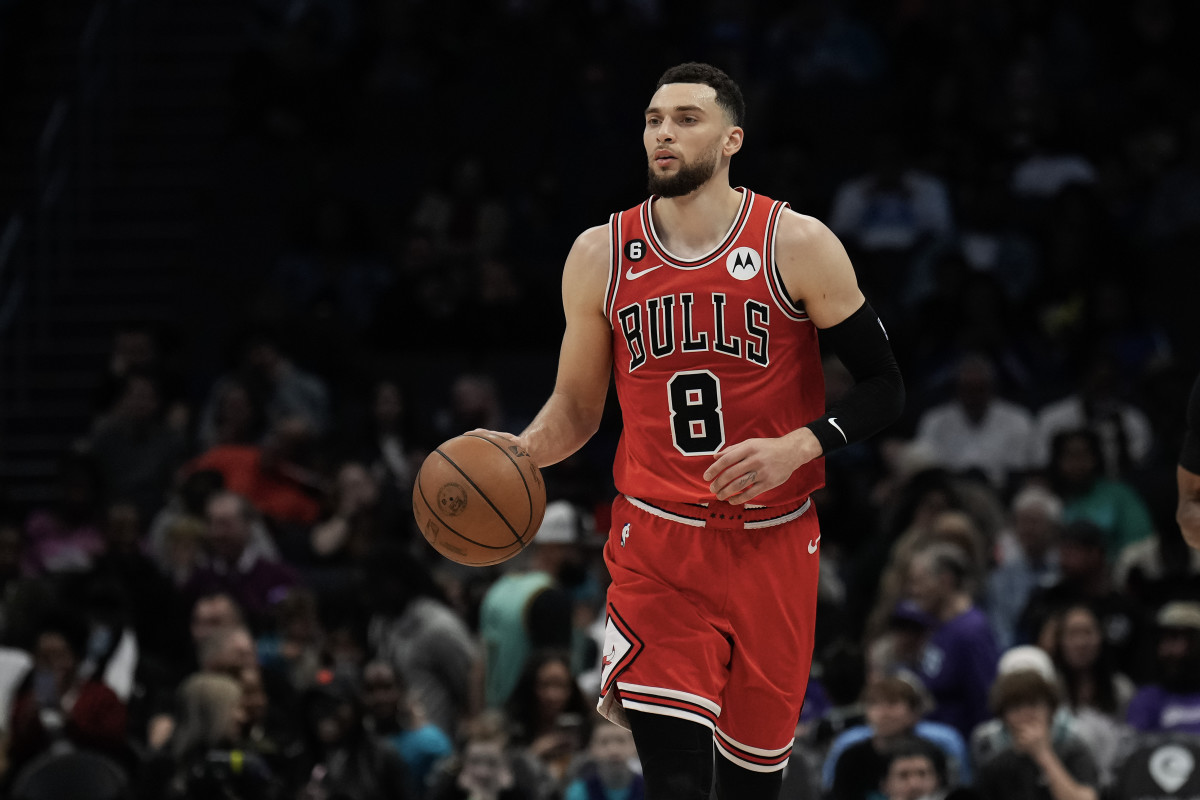
Career Stats With The Bulls: 24.2 PPG, 4.7 RPG, 4.3 APG, 0.9 SPG, 0.4 BPG
Career Achievements With The Bulls: 2x All-Star
From 2018 to 2024, Zach LaVine took over the starting shooting guard position for the Chicago Bulls. LaVine, known for his explosive athleticism, scoring ability, and improved playmaking, quickly established himself as one of the most dynamic scorers in the NBA. His ability to create his own shot, score at all three levels, and make plays for his teammates made him the focal point of the Bulls' offense.
During his tenure as the Bulls' starting shooting guard, LaVine's game continued to evolve and improve. He averaged 23.7 points, 4.7 rebounds, and 4.5 assists per game during the 2018-2019 season, earning his first All-Star selection. LaVine's scoring ability, especially from beyond the arc and in transition, and his improved playmaking were crucial to the Bulls' success.
In the 2020 season, LaVine continued to be a scoring machine. He averaged 25.5 points, 4.8 rebounds, and 4.2 assists per game and earned his second consecutive All-Star selection. However, the Bulls struggled with consistency and defensive issues, finishing the season with a record of 22-43 and failing to make the playoffs.
During the 2021 season, LaVine elevated his game to another level. He averaged 27.4 points, 5.0 rebounds, and 4.9 assists per game and earned his third consecutive All-Star selection. In the 2021-22 season, LaVine's scoring ability, improved playmaking, and leadership were instrumental in helping the Bulls return to the playoffs for the first time since 2017. However, the Bulls were defeated by the Philadelphia 76ers in the first round.
The 2023 and 2024 seasons weren't exactly great for LaVine, since he missed the playoffs in both seasons and only played 25 games in the latter year. Even if LaVine continues to be the star shooting guard of the Bulls, his time could be coming to an end as his name is dangled in trade rumors.
More must-reads:
- Raptors expected to flip former NBA champion during the offseason
- Bulls hire former NBA head coach as top assistant
- The 'Most triple-doubles in the postseason' quiz
Breaking News
Customize Your Newsletter
 +
+
Get the latest news and rumors, customized to your favorite sports and teams. Emailed daily. Always free!

